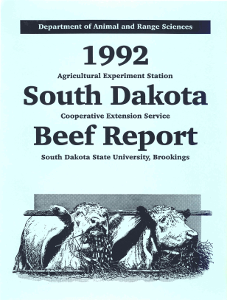Document Type
Report
Report Number
92-11
Publication Date
1992
Keywords
steer calves, housing, bedding, straw, newspaper
Summary
Two hundred seventy-three crossbred steer calves were fed until slaughter (November through May, 189 days) in either semi-confinement (partial overhead shelter, 88 sq. ft. per steer, concrete pen surface) or conventional open lots (windbreak, 448 sq. ft. per steer, dirt surface with mound). Within each housing system, cattle were provided with no bedding or bedding in the form of oat straw or shredded newspaper. Bedding was provided in amounts necessary to maintain a relatively dry, manure-free area large enough for all cattle to lay down at the same time. There were no interactions between housing systems or bedding treatments (P>.10). Feed intake did not dilfer (P>.10) between treatments at any time during the study. On the other hand, overall (day 1 through 189) daily gain was 8.6% greater for steers fed in semi-confinement pens compared to open lots (P<.001). Bedding also improved overall gain by 8.3% (P<.001) compared to no bedding, with newspaper generally being as effective as straw. Similar benefits of housing and bedding were evident in feed efficiency as well. Housing and bedding improved overall feed efficiency 8.2% and 6.8%, respectively (P<.001). Less newspaper than straw was used in this study (232 vs 266 Ib per 100 head per day) and break-even values were $141.88 and $1 14.21 per ton, respectively. Both housing and bedding improved feedlot performance, with bedding being as effective in open lots containing mounds as on concrete. Newspaper can be an effective replacement for more conventional bedding materials.
Number of Pages
4
Format
application/pdf
Language
en
Publisher
South Dakota State University
Rights
Copyright © 1992 South Dakota State University.
Recommended Citation
Birkelo, C. P. and Lounsbery, J., "Effect of Straw and Newspaper Bedding on Cold Season Feedlot Performance in Two Housing Systems" (1992). South Dakota Beef Report, 1992. 12.
https://openprairie.sdstate.edu/sd_beefreport_1992/12

